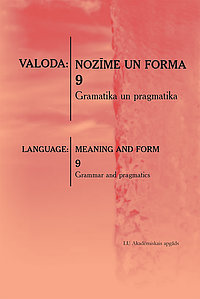Apstiprinājums sengrieķu dialogā
Affirmation in Ancient Greek dialogue
Author(s): Gita BērziņaSubject(s): Language studies, Communication studies, Ancient World, Syntax, Semantics, Historical Linguistics
Published by: Latvijas Universitātes Akadēmiskais apgāds
Keywords: confirmation; ancient Greek; dialogue; semantics; intensity; a person;
Summary/Abstract: Mutual agreement of communication partners, finding of a common position is of great significance in dialogical intercourse, the affirmation being most substantial in this regard. In different languages, various language means and ways of expression can be used for this purpose. The present paper considers the expression of affirmation in the ancient Greek language mainly focusing the attention on the forms used most frequently in short utterances, as well as on dominating regularities in their usage. The choice of a specific form is determined by various factors: the semantic and syntactic structure of the question, i.e., of the preceding utterance, the context, a purposeful stressing of the positions of communication partners, the emphasizing of communicative link, the intensity of respondent’s consent, the confidence in the veracity of communication partner’s utterance, as well as genre characteristics of the literary text and artistic purposes of the author. There are affirmation forms suitable for different situations, forms which express affirmation without additional nuances, and there are definite forms used in specific contexts and situations which together with the semantics of affirmation comprise additional nuances, e.g., as regards its intensity.
Journal: Valoda: nozīme un forma
- Issue Year: 2018
- Issue No: 9
- Page Range: 7-19
- Page Count: 13
- Language: Latvian

